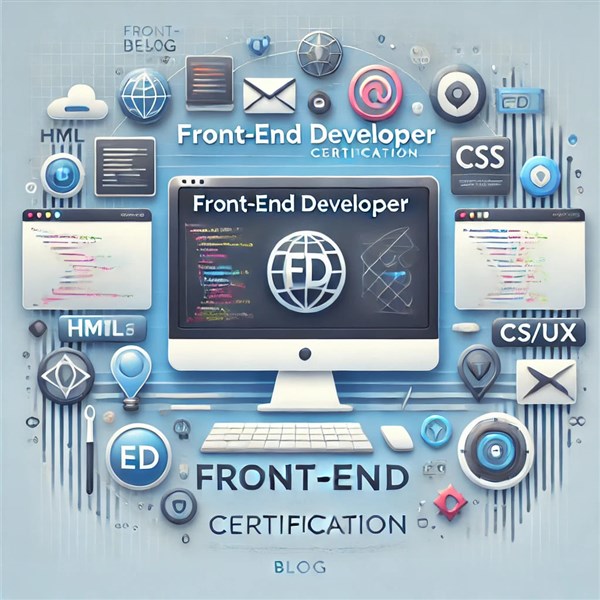
In the fast-paced world of web development, front-end developers are at the forefront of creating interactive, visually appealing websites and applications that users can engage with seamlessly. As the demand for front-end developers continues to grow, obtaining a certification has become an effective way to stand out in this competitive field. A Front-End Developer Certification equips you with a variety of technical and design skills that are essential to excel in web development.
Skills You’ll Master with a Front-End Developer Certification
In this blog, we’ll delve into the core skills you’ll master through a front-end developer certification, why they matter, and how they prepare you for a successful career in web development.
1. Mastery of HTML, CSS, and JavaScript
At the heart of every website are three key technologies: HTML, CSS, and JavaScript. These are the building blocks of web development, and they are foundational skills you’ll master through any comprehensive front-end developer certification.
a. HTML (Hypertext Markup Language)
HTML forms the structure of the web. In a certification course, you’ll learn how to use HTML to create well-structured content, build web forms, embed multimedia elements, and ensure that your code follows best practices for accessibility and SEO optimization.
b. CSS (Cascading Style Sheets)
CSS is what makes the web visually appealing. It’s the tool you’ll use to style your websites, ensuring that they are both responsive and aesthetically pleasing. A certification course will teach you how to use CSS frameworks, such as Bootstrap, to make your designs mobile-friendly and improve page layout consistency across devices.
c. JavaScript
JavaScript is the programming language that makes websites dynamic and interactive. Through a front-end developer certification, you’ll learn how to write JavaScript to handle events, validate forms, create animations, and build interactive user interfaces. You’ll also get introduced to key JavaScript concepts like DOM manipulation, ES6 syntax, and asynchronous programming using Promises and Async/Await.
2. Understanding Responsive Web Design
In today’s mobile-first world, websites need to look and perform well on all screen sizes—from desktops to smartphones. One of the most valuable skills you’ll master through a front-end developer certification is Responsive Web Design.
You’ll learn how to use CSS media queries to create websites that automatically adjust their layout and elements to fit the screen size of any device. You’ll also become familiar with flexbox and grid layouts, which are essential tools for building modern responsive designs. Being able to design and code for different screen sizes makes you highly valuable in today’s web development job market, where user experience is crucial.
3. Proficiency with Version Control Systems (Git)
A front-end developer certification will often include hands-on training with Git, the most popular version control system. Git is essential for collaborating with other developers, managing code changes, and keeping track of the history of your projects.
You’ll learn how to:
- Initialize and manage Git repositories
- Commit code changes
- Create and manage branches
- Merge changes from different branches
- Collaborate with teams using GitHub or GitLab
By mastering Git, you’ll ensure that your code is always safe, well-organized, and easily shareable—a critical skill in both freelance and team-based web development environments.
4. Experience with JavaScript Libraries and Frameworks
JavaScript is the most popular programming language for web development, and it’s essential to know how to work with JavaScript libraries and frameworks to build complex applications efficiently. In a front-end developer certification course, you’ll get hands-on experience with popular frameworks and libraries that streamline your workflow.
a. jQuery
Although not as popular as it once was, jQuery remains a useful tool for simplifying JavaScript operations, especially in legacy code. Certification courses may introduce you to jQuery for manipulating the DOM, handling events, and simplifying HTTP requests.
b. React.js
One of the most in-demand skills for modern front-end developers is proficiency in React.js, a JavaScript library developed by Facebook for building user interfaces. React simplifies the process of creating fast, scalable, and reusable components for web applications. Learning React will open the door to many job opportunities, as it’s widely used by companies across the globe.
c. Vue.js and Angular
While React is dominant, Vue.js and Angular are also highly respected front-end frameworks. Depending on your certification program, you may get exposure to these frameworks as well, gaining a broader understanding of the front-end development ecosystem.
5. Cross-Browser Compatibility
Not all browsers render websites the same way, and ensuring that your websites look and function correctly across different browsers is essential for user experience. As part of a front-end developer certification, you’ll learn how to test for cross-browser compatibility, resolve browser-specific bugs, and use feature detection tools to enhance the performance and functionality of your sites on different platforms.
6. Familiarity with Web Performance Optimization
Web performance is crucial to the user experience. If a website is slow or unresponsive, users are likely to abandon it. Front-end certification programs place a strong emphasis on teaching you web performance optimization techniques to ensure your websites load quickly and perform well.
You’ll learn about:
- Image compression and optimization techniques
- Lazy loading to speed up page performance
- Minification and concatenation of JavaScript and CSS files
- Code splitting in frameworks like React to reduce initial load times
- Content Delivery Networks (CDNs) to distribute web content more efficiently
These skills ensure that you’re not just creating beautiful websites but also high-performing, user-friendly ones.
7. Building Accessible and Inclusive Websites
Accessibility is an essential part of modern web development, ensuring that websites are usable by everyone, including people with disabilities. A front-end developer certification will teach you how to create websites that are compliant with Web Content Accessibility Guidelines (WCAG).
You’ll gain skills in:
- Semantic HTML usage
- Keyboard navigation
- Aria-labels for screen readers
- Color contrast and other design considerations for visually impaired users
By focusing on accessibility, you’ll not only ensure your websites reach a broader audience but also help businesses avoid potential legal issues.
8. Creating Interactive User Interfaces
As a certified front-end developer, you’ll learn how to build interactive and intuitive user interfaces (UIs). Through practical projects and coursework, you’ll be introduced to the fundamentals of UI/UX design, allowing you to create websites that are not only functional but also user-friendly.
You’ll learn about:
- Wireframing and prototyping
- Usability testing
- Responsive UI components
- UI frameworks like Material UI and Ant Design
9. Soft Skills for Effective Communication and Collaboration
In addition to technical skills, front-end developer certification programs often cover the soft skills necessary to work effectively within a team. This includes communication skills, problem-solving, and collaboration—all crucial for delivering high-quality web projects in professional environments.
Conclusion
A front-end developer certification equips you with a wide array of essential skills, from mastering the basics of HTML, CSS, and JavaScript to advanced techniques in responsive design, JavaScript frameworks, version control, and web performance optimization. These skills make you a valuable asset in the job market and prepare you for a career that demands adaptability, creativity, and technical proficiency.
Whether you’re just starting your career or looking to enhance your existing skill set, pursuing a front-end developer certification is a powerful way to gain the knowledge and experience needed to succeed in the evolving field of web development.
A front end developer certification from a reputed institution like Koenig Solutions not only equips you with essential skills but also validates your expertise to potential employers.
Koenig Solutions is a leading IT training company offering certifications in top technology courses. With their comprehensive front-end developer course, you will be fully equipped to make your mark in the field of web development.







COMMENT